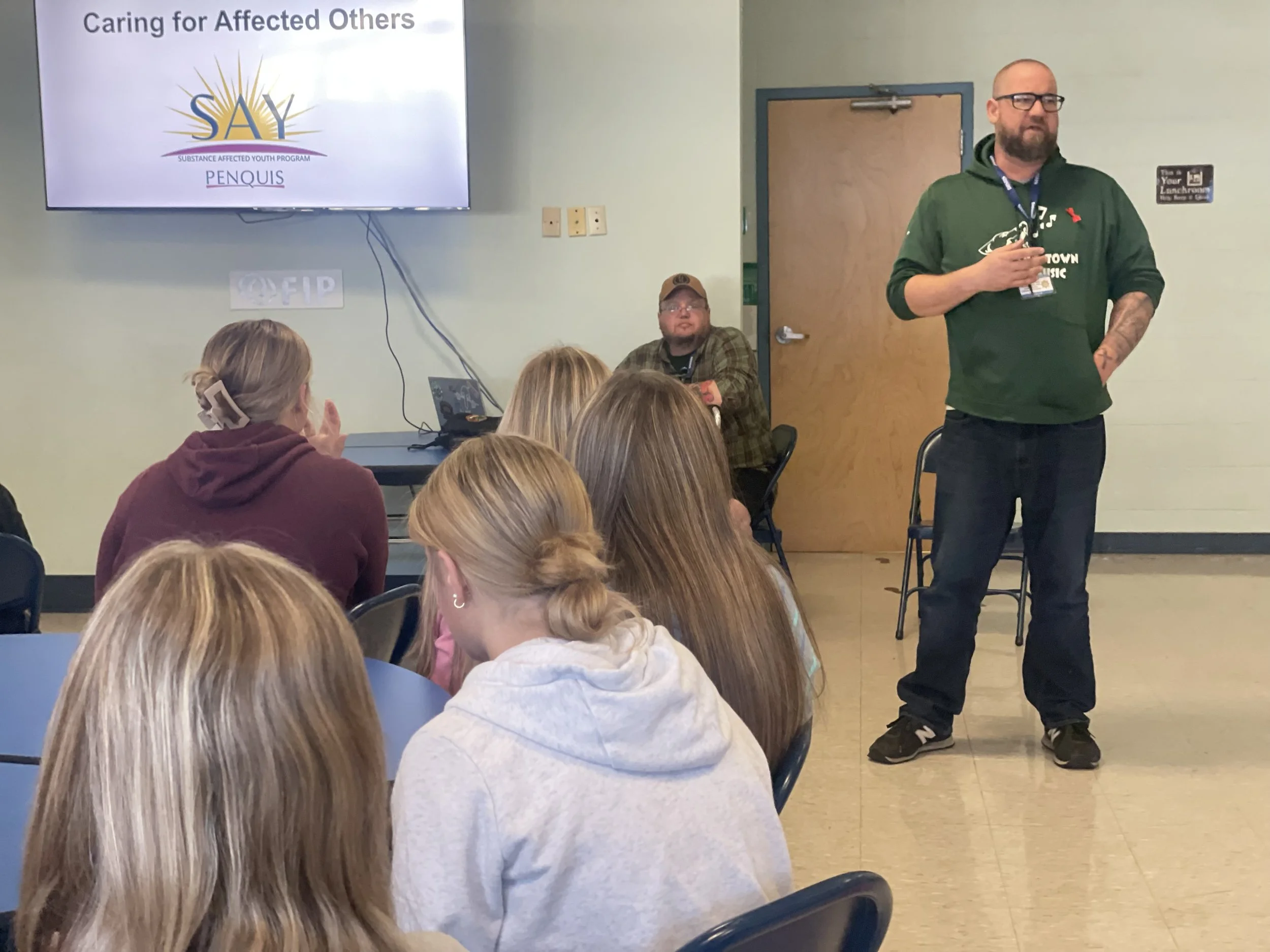Island high school discusses ‘affected others’ and substance addiction
Joe Costello speaks to DISHS students about substance abuse and its effect on others. Photo by Jenna Lookner.
By Jenna Lookner
THE ISLAND — Deer Isle-Stonington High School hosted its annual Red Ribbon Week assembly on Friday, October 24. The assembly is a culmination of a weeklong awareness campaign around the effects of substance abuse and addiction issues.
The event included guests from the Opiate Free Island Partnership and Penquis, a nonprofit focused on alleviating poverty and its causes.
School principal Rebecca Gratz said that a variety of student activities over the week included decorating classroom doors and discovering healthy personal activities that can give them the same effect as a perceived “high.”
“For me, our partnerships with OFIP and participating in annual events like Red Ribbon Week create meaningful opportunities for our students to learn from, and connect with, adults from the larger community,” Gratz said in an email. “Each year, we invite speakers to share their experiences with our students…The adults who share their life experience help many of our students know that they are not alone if they are affected others and to destigmatize conversations and connection around drug use and abuse.”
“Affected others” refers to people who are harmed or influenced by the actions of others.
Red Ribbon Week began 40 years ago to honor DEA agent Enrique "Kiki" Camarena, who was tortured and killed on the orders of a Mexican drug cartel involved in marijuna and cocaine trafficking.
Ashley Pesek, the director of the Opiate Free Island Partnership based in Stonington, and her team work with DISHS to host Red Ribbon Week at the high school. The event this year included Narcan training and information sessions, as well as a presentation on Oct. 24 from guest speakers.
The 2025 guests were Penquis’s Substance Affected Other Youth Program Manager Mike Gray and Youth Resource Navigator Joe Costello. Based in Bangor, Costello regularly travels to area schools.
Students gathered in the cafeteria to hear a one-hour presentation after being pinned with red ribbons during an earlier morning event.
“We loved Joe and Mike’s message and thought you would, too,” she said to the students that had assembled in the cafeteria. Pesek also acknowledged that the topic of “affected others”—those who do not suffer direct substance abuse issues, but are impacted by a close family member or friend who does— can be difficult.
Costello took the floor for the majority of the one-hour presentation. He started by asking students to name the kind of substances that they were discussing and whether they are legal or illegal. Students pointed out that some substances can be both, such as marijuana, alcohol, and fentanyl. Substances like meth were immediately classified as illegal by the students.
Costello asked for signs of addiction that students can recognize. The list included attitude changes, accountability and sluggishness, among others. Even pets can be affected others, he said, noting that his own dogs can react to anger in the home.
“The whole community can be affected in one way or another,” he said.
Gray likened the community to a pond with ripples. A duck on the surface of the pond may be visibly affected by the ripple, while the impact to life below the surface is not as readily apparent, he said.
“There are all kinds of things that might be affected,” he said.
Costello discussed his own experience as an affected other, having lost friends to addiction in his 20s and witnessing his grandfather’s recovery.
“I am very proud to be an affected other,” he said.
He said he first learned about addiction as a young child when his mother took him to a church basement where friends and family had gathered to see his grandfather receive his 25-year coin for sobriety.
He said his mother explained that recovery was something to celebrate, and noted that both she and his grandmother were affected others.
“My grandmother thought she was the worst wife and mother and that is really hard for me to share,” Costello said.
Costello said he has changed the activities he shares with friends with addiction. He said they eat out for breakfast rather than dinner, so there is less suggestion that it’s time to have a drink, he said.
“We still hang out,” he said of one of his friends. “But we don’t watch football and we don’t drink beer.”
Costello assists another close friend who is experiencing homelessness due to addiction. He said he picks up medications and assists him in various ways, but has to be mindful of boundaries.
“I wish I could give you a conclusion,” he said. “But Mark is still out there doing harm to himself.”
He spoke of another friend who succumbed to his addiction. He was found dead on a bus despite the best efforts of multiple people who had tried to help him.
“If there is anyone here that has lost somebody, you are not alone,” he said.
To learn more about the Opiate Free Island Partnership, follow them on Facebook.


